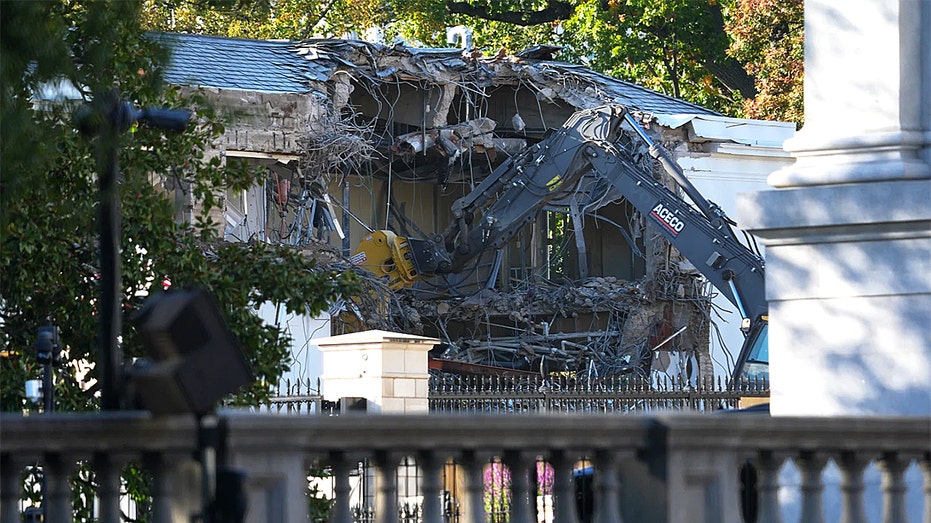President Donald Trump isn’t the first commander-in-chief to face scrutiny over White House renovations.
Throughout its 223-year history, the iconic residence has seen numerous updates — both large and small — under nearly every administration.
Many on the left have been in an uproar of late, accusing Trump of damaging White House history as construction begins on a new White House ballroom.
FIRST LADY MELANIA TRUMP COMMITTED TO ‘TRADITION’ OF WHITE HOUSE TOURS AFTER BALLROOM CONSTRUCTION
President Trump’s privately funded $200 million White House ballroom is the latest "bold, necessary addition" to the executive residence, officials said, describing the East Wing construction as a continuation of presidential upgrades dating back more than a century.
Sen. Richard Blumenthal, D-Conn., questioned what leverage contributors might have over Trump if they are donating to the renovation.
Former Secretary of State Hillary Clinton also criticized the move, writing Tuesday on X, "It’s not his house. It’s your house. And he’s destroying it."
Construction on the ballroom kicked off Monday, with the project "expected to be completed long before the end of President Trump’s term," according to the White House.
"Nearly every single president who’s lived in this beautiful White House behind me has made modernizations and renovations of their own," said Karoline Leavitt, press secretary, at the podium recently.
TRUMP CELEBRATES WHITE HOUSE DEMOLITION AS NEW BALLROOM RISES: ‘MUSIC TO MY EARS’
"In fact, presidents for decades — in modern times — have joked about how they wished they had a larger event space here at the White House, something that could hold hundreds more people than the current East Room and State Dining Room," she added.
President Trump recently directed the addition of stone pavers to the Rose Garden lawn, a change designed to better accommodate press conferences and ceremonial events.
Dubbed the Rose Garden Club, the event space recently hosted Senate Republicans on Tuesday.
From President Bill Clinton's creation of a jogging path around the South Grounds driveway to President Dwight Eisenhower's installation of a putting green, the People’s House has continually evolved to reflect the times and the presidents who called it home.
Here's a look at some of the most notable renovations that have shaped the White House through the years.
Before it was officially known as the White House, the residence was commonly called the Executive Mansion or the President’s House. President Theodore Roosevelt is credited with making the "White House" official when Congress allocated funds for repairs and refurnishing, according to the National Park Service.
KAROLINE LEAVITT: THE WHITE HOUSE WILL HAVE A BIG, BEAUTIFUL BALLROOM FOR GENERATIONS TO COME
During this period, Roosevelt also replaced the old conservatories with new executive offices, establishing what became known as the West Wing. Work began in June 1902 and was completed by the year-end.
President Taft held a competition to select an architect to make Roosevelt’s temporary West Wing permanent, according to the White House Historical Association (WHAA).
Washington, D.C.'s Nathan C. Wyeth designed the expansion and created the Oval Office. Wyeth was inspired by the Blue Room in the White House for its oval shape, creating a "levee."
"The levee, a tradition that evolved from the English court, was an occasion to allow men of prominence to meet the president," writes the WHAA.
Guests entered the room, approached the president by the fireplace, and bowed as an aide announced their names.
TEST YOURSELF WITH OUR LATEST LIFESTYLE QUIZ
The doors would then close with guests standing in a semi-circle as the president moved around the group, greeting each person.
The East Wing was erected in 1942 during FDR’s administration to house additional staff and offices. The East Wing project was highly controversial amid World War II.
"Congressional Republicans labeled the expenditure as wasteful, with some accusing Roosevelt of using the project to bolster his presidency’s image," the WHAA notes on its website.
CLICK HERE TO SIGN UP FOR OUR LIFESTYLE NEWSLETTER
An indoor swimming pool had been installed earlier, in 1933, following FDR’s polio diagnosis so he could swim regularly for exercise.
The Daily News created the "Roosevelt Swimming Pool Fund" for the project, raising over $12,000, according to the WHAA.
President Richard Nixon then converted the pool into the White House Press Room in 1970 to create a space for the growing press.
Nixon reportedly did not want any harm done to the structure, so the pool could be restored easily, with a project architect saying this was "in case he received comments that he destroyed the FDR pool."
The Gerald Ford administration installed an outdoor pool on the South Lawn in 1975.
President Truman "gutted" the White House starting in 1948, costing a total of $5.7 million. The work was authorized by Congress to fix the physical stress the building was under, as there were fears of a collapse.
Two automatic bowling lanes were first installed in the White House during the administration of President Harry Truman.
This was later moved to the Executive Office Building basement.
CLICK HERE FOR MORE LIFESTYLE STORIES
Avid bowlers, President Nixon and Mrs. Nixon added a new one-lane alley.
The alley was paid for by Nixon’s friends, according to documents housed by the Gerald R. Ford Presidential Library.
President Obama transformed an existing tennis court into a full-court basketball court.
"The White House has had a smaller outdoor court since 1991, but the adapted tennis court allows enough room for a full-court game of basketball," reads the Obama White House official website.
Fox News Digital reached out to the Obama Foundation for comment.
Madison Colombo of Fox News Digital contributed reporting.
The post White House makeovers have long sparked controversy, well before President Trump's $200M ballroom appeared first on FOX News


